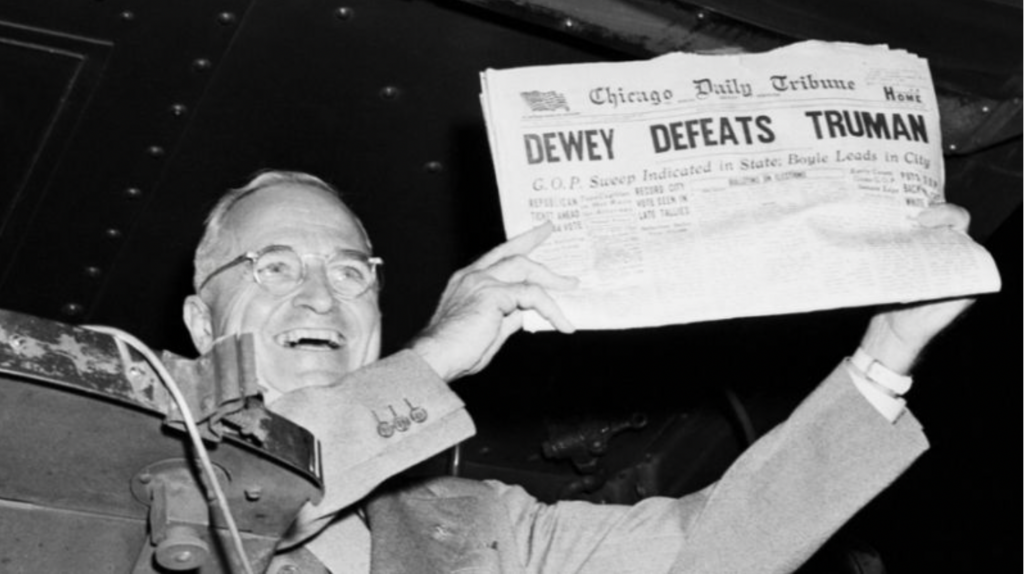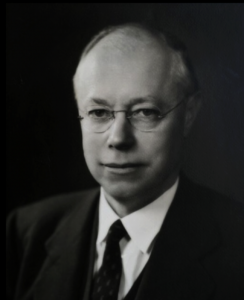Who deserves blame for starting the Cold War?
Brands, Chapter 2: The War That Never Ended, 1946-48
- Mild About Harry (pp. 24-28)
- Sounding the Tocsin (pp. 28-32)
- A Concept and a Doctrine (pp. 32-35)
- Cold War Dissenters (pp. 35-37)
- A Man With A Plan (pp. 37-40)
- One If By Land, Two If By Air (pp. 40-41)
- Dewey Or Don’t We? (pp. 41-44)
Image Gateway
Timeline
- 1945 // United Nations
- 1946 // Kennan’s Long Telegram
- 1946 // Iron Curtain Speech
- 1947 // Truman Doctrine
- 1947 // National Security Act
- 1947-48 // Marshall Plan
- 1948-49// Berlin Airlift
- 1948 // Truman wins second term
From Jordan Forry’s “America on the Home Front During the Early Cold War”
Lois Shaffer recalls that after following the situation on the radio, she and her husband became impressed with the feat that the U.S. military was able to accomplish, but she was also quick to point out that they did not necessarily follow the progress of the airlift on a day to day basis.
Containment Policy
From Churchill’s “Iron Curtain” speech in Fulton, Missouri (1946)
Churchill’s stern 1946 warning about the Soviets highlighted a growing tension in superpower relations, a period that columnist Walter Lippmann described memorably as “The Cold War.” The US policy toward the Soviet Union which subsequently defined this Cold War period has come to be known as containment. State Department official George Kennan helped develop this containment doctrine, principally through two powerful documents, the so-called “Long Telegram,” and an anonymous article for the journal Foreign Affairs, titled, “The Sources of Soviet Conduct.” Here is an excerpt from the now-famous 1947 article:
These considerations make Soviet diplomacy at once easier and more difficult to deal with than the diplomacy of individual aggressive leaders like Napoleon and Hitler. On the one hand it is more sensitive to contrary force, more ready to yield on individual sectors of the diplomatic front when that force is felt to be too strong, and thus more rational in the logic and rhetoric of power. On the other hand it cannot be easily defeated or discouraged by a single victory on the part of its opponents….In these circumstances it is clear that the main element of any United States policy toward the Soviet Union must be that of a long-term, patient but firm and vigilant containment of Russian expansive tendencies.
Discussion Question
- How did developments such as the Truman Doctrine (1947), Marshall Plan (1947) and Berlin Airlift (1948) help illustrate the initial application of containment principles?
- Who were the leading American critics of containment policy and what were the differences in the views of figure such as Senator Robert Taft, a leading conservative, or Henry Wallace, a prominent progressive?
Progressive Alternatives: Henry Wallace
Election of 1948 and the Landscape of Post-War American Politics
Post-war American politics became complicated by competing ideologies that vied for control of American political parties and the broader national culture. The Democratic New Deal coalition splintered in 1948 as many Southern Democrats or Dixiecrats refused to support the party’s evolution toward more open support for civil rights. Democrats also endured a battle between liberals (like Harry Truman) who supported New Deal values at home and Cold War containment abroad and progressive (like Henry Wallace) who questioned the foreign policy establishment. Republicans were divided between conservatives (like Sen. Robert Taft of Ohio) and ultra anti-communist demagogues (like Rep. Richard Nixon from California in 1948 or later Sen. Joseph McCarthy from Wisconsin) and moderates (such as Gov. Tom Dewey from New York). Outside of the mainstream parties there were also other ideologies competing for American support, including libertarianism, socialism and communism. Critics derided these fringe movements as extremists, but many persevered and ultimately influenced US policy in sometimes-powerful ways. But in 1948, it was Truman and New Deal liberals who prevailed in what many regarded as a stunning upset victory.



